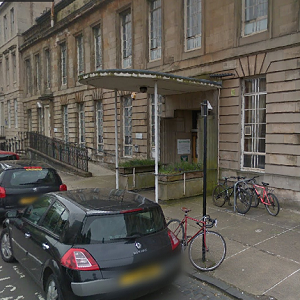Scotland will not let cruel High Court puberty blockers ruling stop trans kids from receiving life-saving treatment, officials confirm

Sandyford gender clinic in Glasgow.
Scotland has no plans to follow the directives of London’s High Court ruling on access to puberty blockers for transgender teenagers, the head of the largest Scottish gender clinic has confirmed.
The High Court, one of the senior courts of England and Wales, ruled on 1 December that transgender under-16s must understand the implications both of puberty blockers and of potentially moving on to hormone therapy in order to consent to the medication.
Effectively, the ruling means clinicians in England and Wales must now seek court approval before prescribing hormones, a decision that parents of trans kids told PinkNews was “devastating, discriminatory and cruel”.
Scotland is not bound by the ruling, and in its wake NHS Scotland’s sole youth gender clinic, the Sandyford Young People Gender Service, issued a statement saying it would not be reviewing its services for young trans people. It does not accept referrals from England.
Consultant psychiatrist Dr Gerber, clinical lead of Sandyford’s Gender Identity Service, where he has worked for 18 years, warned that it would be very distressing for young trans people to wait “months or years” for their case to be heard while they progress in the wrong puberty.
“It’s a rigorous assessment. Sending people to court will make it more difficult for people needing to come forward,” Gerber told Glasgow Live.
“People who need to transition will feel more reluctant to do so. It could cause problems for the future for them and for their families. If you’re waiting for a high court judgment, it could take months or years for each individual case. It’s a time-sensitive process.
“By that stage, someone could be well into puberty, then it’s too late and you’ve ‘missed the boat’. That’s the concern.”
Gerber explained that Sandyford has been operating since the 1980s and receives several hundred referrals a year, with a waiting list of three years for a first appointment.
“It’s a hugely underfunded area of healthcare. It is still not seen as a priority,” he said.
The landmark judicial review into transgender under-18s’ access to puberty blocking medication was held at London’s High Court on 7 and 8 October.
The case hinged on whether under-18s can give informed consent to the treatment.
The judicial review was brought against The Tavistock and Portman NHS Trust, which houses the Gender Identity Development Services (GIDS) clinic, and which supports young people, and their families, who are experiencing difficulties around their gender identity.
It was brought by Keira Bell, 23, who took puberty blockers at 16 and had top surgery at 20 but has since detransitioned, and Mrs A, who is trying to prevent her 16-year-old child taking puberty blockers.
Gerber also addressed detransition rates, telling Glasgow Live that it is “pretty rare”.
“Surveys among the trans population report the rate of regret is around 1 per cent,” he said. “We’re starting to see a few more people doing so though and I think this is becoming normalised to a certain degree, which is concerning.
“Once you’ve gone through all of the steps, there’s no going back. The incidence of being transgender is exceedingly rare, and going through the process to later regret it is even more so.”
He also acknowledged the fears generated by the High Court ruling, amplified by transphobic rhetoric in the media, that puberty blockers are dangerous for children – and pointed out that only a “small handful” of trans teens are prescribed them a year, around 30 out of hundreds of patients in any given year in Scotland.
“There are international guidelines for prescribing of hormones that we follow. If a person is young, we would involve the families and other people in that assessment in discussing the medical treatment as you would with any other treatment. We take many factors and opinions into account. That would be the safeguard,” Gerber said.
He added: “The number of people presenting for treatment at transgender clinics has increased worldwide. Previously we might have had 10 under-16s a year referred to Sandyford. Now we have in the region of 200 or 300, something like that.
“Obviously there are more patients now being prescribed hormones as a result of the above trend, but it’s still a small percentage of the overall number. The proportion hasn’t changed that much. We are still very selective. It is false to suggest the clinic is dishing drugs out like Smarties, the way it is being portrayed in the media.”

